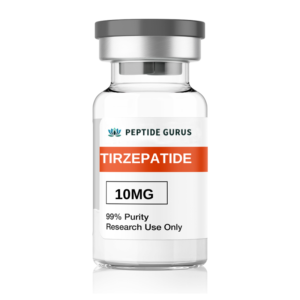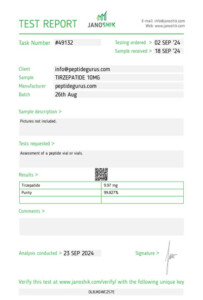Diabetes is a global health concern, affecting millions of people worldwide. Among the various treatment options available, tirzepatide peptide has emerged as a promising solution for managing diabetes, especially type 2 diabetes. This article will explore what tirzepatide peptide is, how it works, its benefits, and how it aligns with the latest FDA guidelines.
What is Tirzepatide Peptide?
Tirzepatide, also known by its brand name Mounjaro in the US, is a medication developed by Eli Lilly. It is a unique peptide that acts as a dual receptor agonist, targeting both the glucose-dependent insulinotropic polypeptide (GIP) and glucagon-like peptide-1 (GLP-1) receptors. These two hormones play crucial roles in regulating blood sugar levels and appetite.
How Does Tirzepatide Work?
Dual Receptor Activation
By binding to and activating both the GIP and GLP-1 receptors, tirzepatide mimics the natural action of these hormones in the body. When GIP and GLP-1 are released in response to food intake, they stimulate the pancreas to produce more insulin, a hormone that helps cells absorb glucose from the bloodstream. This leads to a decrease in blood sugar levels. Additionally, tirzepatide slows down the rate at which the stomach empties, which helps in reducing hunger and promoting a feeling of fullness.
Appetite Suppression
One of the key advantages of tirzepatide is its ability to suppress appetite. By activating the GLP-1 receptor, it sends signals to the brain’s appetite control centers, reducing the urge to eat. This can be particularly beneficial for patients with type 2 diabetes who often struggle with weight management, as excess weight can exacerbate the condition.
Tirzepatide and FDA Approval
In 2022, the US Food and Drug Administration (FDA) approved tirzepatide for use in adults with type 2 diabetes as an adjunct to diet and exercise to improve blood sugar control. This approval was based on the results of several large-scale clinical trials that demonstrated the drug’s effectiveness and safety.
Clinical Trial Results
The trials showed that tirzepatide significantly reduced hemoglobin A1c (HbA1c) levels, a key marker of long-term blood sugar control, compared to placebo and other standard diabetes medications. In addition to improving glycemic control, many patients also experienced weight loss, which further contributed to better overall health outcomes.
FDA Guidelines on Compounding
Recently, the FDA has made determinations regarding the shortage of tirzepatide injection products. As of December 19, 2024, the shortage was officially resolved. According to the federal Food, Drug, and Cosmetic Act, section 503a and 503b, pharmacies and outsourcing facilities are generally prohibited from compounding essential copies of commercially available approved drugs. However, there were exceptions when the drugs were on the FDA’s drug shortage list. Now that the shortage is resolved, state – licensed pharmacies or physicians (503a) can no longer compound tirzepatide as of March 5, 2025, and outsourcing facilities (503b) will face enforcement action starting from March 19, 2025 if they continue to compound. This is to ensure that patients receive safe and regulated medications.
Benefits of Tirzepatide for Diabetes Treatment
Effective Glycemic Control
Tirzepatide has shown remarkable results in lowering blood sugar levels. It helps patients achieve better HbA1c targets, reducing the risk of long-term complications associated with diabetes, such as nerve damage, kidney disease, and vision problems.
Weight Management
For many patients with type 2 diabetes, weight management is a challenge. Tirzepatide’s appetite – suppressing effect often leads to weight loss, which can improve insulin sensitivity and further enhance blood sugar control. This dual benefit of improved glycemic control and weight management makes tirzepatide a valuable treatment option.
Convenient Administration
Tirzepatide is administered via a once – weekly subcutaneous injection. This dosing schedule is more convenient compared to some other diabetes medications that require multiple daily doses, which can improve patient compliance and overall treatment effectiveness.
Frequently Asked Questions
1. How do I start taking tirzepatide?
The recommended starting dose is 2.5mg once a week, administered via subcutaneous injection. This dose is continued for 4 weeks. After that, the dose is increased to 5mg once a week. Your doctor will determine the appropriate dose for you based on your individual needs and response to the treatment.
2. Are there any side effects of tirzepatide?
Common side effects may include nausea, vomiting, diarrhea, decreased appetite, and constipation. These side effects are usually mild to moderate and tend to improve over time as your body adjusts to the medication. However, if you experience severe or persistent side effects, it’s important to contact your doctor immediately.
3. Can tirzepatide be used in combination with other diabetes medications?
In many cases, yes. Your doctor may prescribe tirzepatide in combination with other medications such as metformin, sulfonylureas, or thiazolidinediones to achieve better blood sugar control. However, it’s crucial to follow your doctor’s instructions carefully and inform them of all the medications you are currently taking to avoid potential drug interactions.

